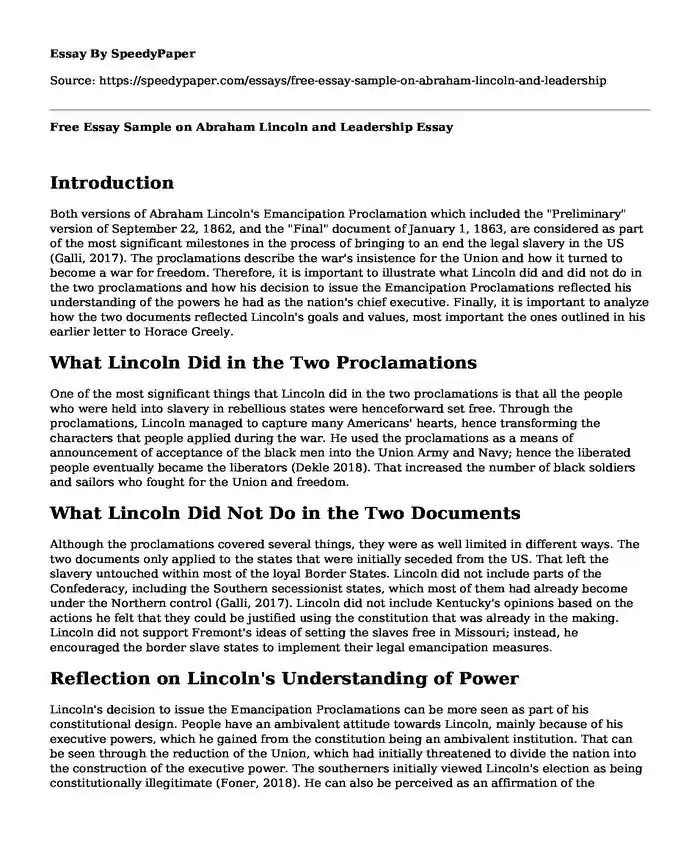
| Type of paper: | Essay |
| Categories: | Leadership analysis History Abraham Lincoln |
| Pages: | 3 |
| Wordcount: | 623 words |
Introduction
Both versions of Abraham Lincoln's Emancipation Proclamation which included the "Preliminary" version of September 22, 1862, and the "Final" document of January 1, 1863, are considered as part of the most significant milestones in the process of bringing to an end the legal slavery in the US (Galli, 2017). The proclamations describe the war's insistence for the Union and how it turned to become a war for freedom. Therefore, it is important to illustrate what Lincoln did and did not do in the two proclamations and how his decision to issue the Emancipation Proclamations reflected his understanding of the powers he had as the nation's chief executive. Finally, it is important to analyze how the two documents reflected Lincoln's goals and values, most important the ones outlined in his earlier letter to Horace Greely.
What Lincoln Did in the Two Proclamations
One of the most significant things that Lincoln did in the two proclamations is that all the people who were held into slavery in rebellious states were henceforward set free. Through the proclamations, Lincoln managed to capture many Americans' hearts, hence transforming the characters that people applied during the war. He used the proclamations as a means of announcement of acceptance of the black men into the Union Army and Navy; hence the liberated people eventually became the liberators (Dekle 2018). That increased the number of black soldiers and sailors who fought for the Union and freedom.
What Lincoln Did Not Do in the Two Documents
Although the proclamations covered several things, they were as well limited in different ways. The two documents only applied to the states that were initially seceded from the US. That left the slavery untouched within most of the loyal Border States. Lincoln did not include parts of the Confederacy, including the Southern secessionist states, which most of them had already become under the Northern control (Galli, 2017). Lincoln did not include Kentucky's opinions based on the actions he felt that they could be justified using the constitution that was already in the making. Lincoln did not support Fremont's ideas of setting the slaves free in Missouri; instead, he encouraged the border slave states to implement their legal emancipation measures.
Reflection on Lincoln's Understanding of Power
Lincoln's decision to issue the Emancipation Proclamations can be more seen as part of his constitutional design. People have an ambivalent attitude towards Lincoln, mainly because of his executive powers, which he gained from the constitution being an ambivalent institution. That can be seen through the reduction of the Union, which had initially threatened to divide the nation into the construction of the executive power. The southerners initially viewed Lincoln's election as being constitutionally illegitimate (Foner, 2018). He can also be perceived as an affirmation of the constitutional orthodoxy, which played a significant part in defusing the threats of the southern disunionism.
Conclusion
Some of the key goals, especially those outlined in the letter to Horace Greely, included enacting measures that would help abolish slavery. As outlined in the letter to Horace Greely, the other goal was to defend the Confederacy, and he was right by deciding to support the Union. Most of his leadership was based on the values he possessed, which included liberty and equality. Those values were reflected from how words and his actions were outlined in the letter to Horace Greely.
References
Dekle, Sr, G. S. (2018). Lincoln before Lincoln: Early Cinematic Adaptations of the Life of America's Greatest President. Journal of the Illinois State Historical Society, 111(4), 122-123.
http://search.proquest.com/openview
Foner, E. (2018). The Fiery Trial: Abraham Lincoln and American Slavery. The Chautauqua Journal, 2(1), 5. https://encompass.eku.edu/tcj/vol2/iss1/5/
Galli, B. J. (2017). Lessons From Lincoln’s Leadership. Journal of Leadership Studies, 11(2), 72-80. https://onlinelibrary.wiley.com/doi/abs/10.1002/jls.21517.
Cite this page
Free Essay Sample on Abraham Lincoln and Leadership. (2023, Nov 10). Retrieved from https://speedypaper.net/essays/free-essay-sample-on-abraham-lincoln-and-leadership
Request Removal
If you are the original author of this essay and no longer wish to have it published on the SpeedyPaper website, please click below to request its removal:
- Free Essay Example: Succession Planning for a CEO
- Politics and Health Policy Thread, Free Essay Sample for Students
- In-Process Reflection Paper Example: Youth Driving Safety Project
- Free Essay: Servant Leaders Have to Be Empathetic
- Free Essay Sample. Contingency Leadership Theory
- Free Essay. Economic and Political Issues Raised By Having an Imbalance between Free and Slave States
- Essay Example. Chinese Exclusion Act and the Kansas Exodus
Popular categories




